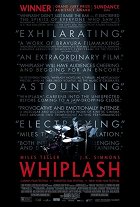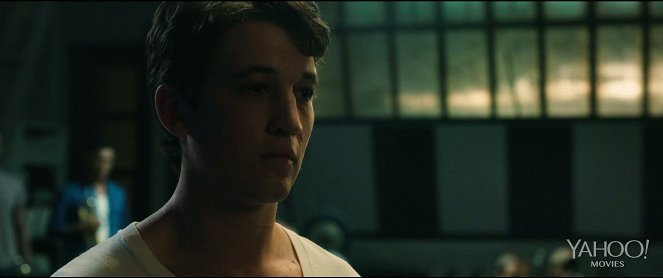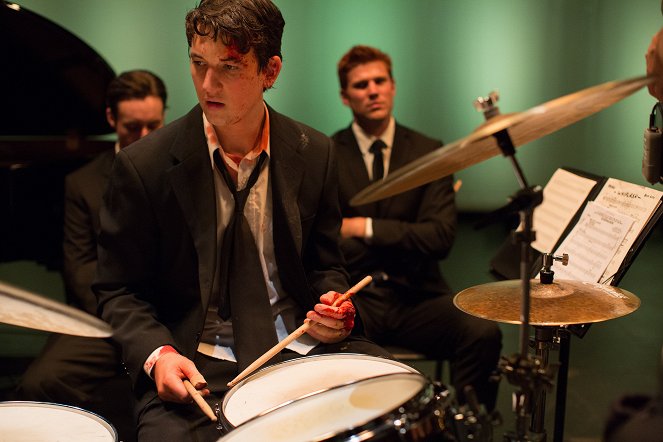Directed by:
Damien ChazelleScreenplay:
Damien ChazelleCinematography:
Sharone MeirComposer:
Justin HurwitzCast:
Miles Teller, J.K. Simmons, Paul Reiser, Melissa Benoist, Austin Stowell, Nate Lang, Chris Mulkey, Damon Gupton, Max Kasch, Jayson Blair, April Grace, C.J. Vana (more)VOD (3)
Plots(1)
Andrew Neiman is an ambitious young jazz drummer, single-minded in his pursuit to rise to the top of his elite east coast music conservatory. Plagued by the failed writing career of his father, Andrew hungers day and night to become one of the greats. Terence Fletcher, an instructor equally known for his teaching talents as for his terrifying methods, leads the top jazz ensemble in the school. Fletcher discovers Andrew and transfers the aspiring drummer into his band, forever changing the young man's life. Andrew's passion to achieve perfection quickly spirals into obsession, as his ruthless teacher continues to push him to the brink of both his ability — and his sanity. (Sony Pictures Classics)
(more)Videos (5)
Reviews (14)
The film may push the despot-pupil relationship a little too much, but there’s no better demonstration in recent years that talent alone is not enough; that talent, not nourished by daily grind, immeasurable diligence, focus and a desire for maximalism, regardless of the obstacles, is actually useless. Because as J.K. Simmons says “There are no two words in the English language more harmful than ‘good job’.” Fuck "good job", geniuses must want more. The last time I experienced similar feelings was with the 1961 film The Hustler, with Paul Newman, which says the same thing about talent, though in a completely different industry. The message of this film is more or less clear and it doesn't matter if it is about drummers, violinists, billiard players or tennis players, its insight about Talent is universal.
()
It's like a Frost / Nixon Duel, where Nixon and Nixon face each other. Not only a captivating exercise in rhythmic editing, but surprisingly unpredictable at the right moments - none of the characters (teacher or student) represents a positive or negative model here. Instead of enlightenment, creative madness takes place. Chazelle pitted two obsessed and unscrupulous bastards against each other, treating their human aspects the same way they treat each other. He bluntly throws them away as a burden and returns to them only marginally. Whiplash could have been crap in many ways - a melodrama about a boy who appreciates the power of love, a celebration of a genius who rises in a difficult struggle with his unrivaled role model, but in reality it is more of a captivating solo about the obsession and destructiveness of those who desire perfection at any cost. I appreciate that Chazelle avoids annoying genre schemes at key moments simply because he ignores any other themes and dares to uncompromisingly release scenes that we would watch for much longer in other films, and which would "characterize" the characters more and allow us to identify with them (e.g., the preparation for the final concert). Like Andrew and Terence, Whiplash pursues what it wants hard - euphoria mixed with light resistance and never-fulfilled peace between the central duo. In Star Wars terminology: the dark side has once again won. The triumph of sociopaths. That's the way it's supposed to be. Certainly not the most layered film, but definitely something like Black Swan made without a snobbish effort to be demonic. It's there from the first bar. In every tone and in every shot of photogenically dark New York. [85%] P. S. I am categorically asking for an Oscar for jazz Darth Vader.
()
Whiplash works on the principle of a wrestling match. A treacherous, ruthless wrestler who breaks all fair play rules intentionally provokes the audience and tries to incite them against himself in order to (apparently) triumph over his opponent and whip up the emotions of the viewers to the maximum. The director manipulates his audience in the same way - and that's my fundamental problem with the film. I simply don't like manipulative directors, which is probably why I didn't warm up to Aronofsky and I have been avoiding Lars von Trier's recent works. On the other hand, Damien Chazelle brilliantly directed his film, and it's evident that he fulfilled the task he set for himself. He was able to lean on the excellent acting performances of both main actors, especially Simmons, who is absolutely convincing in the role of a tyrant, and it's clear that he savored that role. About halfway through the film, I said to myself: "Dear God, I'm watching a sports film whose scheme has been transferred to a different setting." This could actually work, more or less, in certain sports disciplines, such as combat sports, but it would probably work much worse, if at all, in team sports, because a similar coach's strategy would completely upset the team and ruin their psychology. And the idea that something similar could work in reality within a musical ensemble is completely absurd. However, yes, top conductors are often narcissists and it's not easy to work with them, but they would certainly not dare to apply something like that to their players, because only coordination ensures success. Moreover, I believe that in the school environment in America, they are very sensitive to barbaric behavior like that which conductor Fletcher exhibited toward his students, and he would come up against resistance from the students and their parents much sooner than the film suggests. In the end, I lean towards giving it only three stars because it's done for effect, which doesn't suit my taste. I want to believe in the film, and Chazelle didn't succeed in that. Overall impression: 60%.
()
Is there a line? The Black Swan of 2014. In a younger guise, with liters of sweat, blood, and tears. And with a visual side that, with its precision, cuts, and interconnection with the unrelenting rhythm, does not allow you to exhale. Every attempt at harmony, every moment when you push Andrew to finally rattle the drumsticks in a satisfying way, which will keep the demon Fletcher under control for at least a few more minutes – they always result in the same thing: accelerated breathing, tensed muscles, heightened senses. Whiplash grabs hold, crushes, and does not let go. And it chewed me up to the highest rating, because even just a few years after it was shocking, it had aged in a remarkable way. However slightly it pinched me towards the end of its time and I wanted just one more hint, today I wouldn't change anything in the movie at all. It runs at full speed the whole time and in the era of increasingly predictable academic elections or nominations, it remains possibly the last surprising choice that pleasantly caught the critical and audience public off guard. And now I'm going to catch my breath. With every longer viewing, the finale physically exhausts me more and more, although I'm afraid to even move one bit.
()
It never occurred to me that I would see such a great and well-made drama. This movie is also about music, but the focus lies on the story and the relationship between the two main protagonists. The young and talented Andrew, played in an exquisite way by Miles Teller, gets regular dressing down from the brutal conductor Terence Fletcher, who might be a bastard with the best catchphrases in this millennium. The comparison of J. K. Simmons’ role to those of other movie psychos, for example from Full Metal Jacket or Apocalypse Now, is really apt. You won’t believe until you watch this. And the hardest to believe will be the ending itself, which for me immediately became one of the most important and fundamental dramatic film endings I have ever seen. I stared at the screen and sweated for the actors. This was one of the most challenging films I've seen in a very long time... but it was worth it!
()



Ads